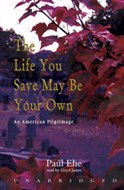In this radio program, Paul Elie is interviewed about the lives of four religiously influential authors of the twentieth century. Elie is being interviewed because he wrote, "The life you save may be your own," a book about the four authors, Walker Percy, Flannery O'Connor, Thomas Merton, and Dorothy Day. Paul Elie is of Catholic upbringing, and has been published in many literary magazines. He is the editor of FSG, and defines a pilgrimage as a journey undertaken in the light of a story. He says that the authors and people in general convert religions because they feel that they are born into a story that isn’t their own, and want to find their own story through their own pilgrimage. He says that through writing his book, he has realized how catholic the Catholic faith is. Meaning through examining the faith of these four extraordinary writers he has realized that they would all come up with four different answers tot he same questions, but they would all be faith filled correct answers.
First he speaks of the life of Dorothy Day . Early in her life she lived the Bohemian lifestyle, and traveled across Europe with her husband, and even had an abortion. However, later in life, when Catholicism was a factor to her, she had a baby and baptized it. This was a sacrifice for her because when she baptized the baby her husband left her. Her faith was formed by reading Dickens’s and Tolstoy, in which she found a sense of connectedness, which could most fully be fulfilled in the catholic faith. Her greatest achievement was helping the poor. She herself wanted to be connected to them, so she because Catholic because there were many poor Catholics in her time and place. Through her pilgrimage she came to realize that love is the only solution to the long loneliness.
Next he speaks of Flannery O'Connor , who is the only author mentioned that was indeed born and raised a Catholic. Flannery was a fiction writer who found truth in the stories of the Old Testament, and could relate them to her life in the Southern United States. She believed that disbelief combined with attraction to the Holy defined her time. Flannery O'Connor along with Thomas Merton had a great sense of comedy, deep faith, and great intelligence.
Next Pail Elie speaks of Walker Percy . Percy, like O'Connor, was a fiction writer. Percy was also a New Orleans physician who was prone to despair because his family was full of tragic death and suicide. He found that philosophy led him to Catholicism. And he identified the importance of life with religion.
The last author Paul lie speaks of is Thomas Merton . Merton was a Trappist Monk that wrote his autobiography, "7 story mountain." in his early thirties. In a move a great courage, he later changed the views he expressed within his autobiography. Later in life he went from viewing the apartness in humanity, to the togetherness in humanity. He believed that restlessness is the core of spirituality, and his most truthful writings are his journals, which were never published.
The best connection I can give of the entire program is in the closing words of Paul Elie himself, "the four writers this book is about sought the truth personally—in charity, in prayer, in art, in philosophy. Their writing was the most personal way of all, for in the act of reading and writing one stranger and another go forth to meet in an encounter of the profoundest sort. In this encounter, there are no self-evident truths. Nothing can be taken for granted or asserted outright. The case must be made to each of us individually, with fierce attention on both sides; we must be persuaded one at a time."
< back to home page
back to home page
 back to home page
back to home page